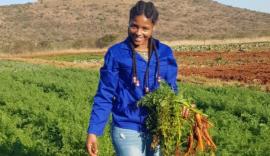
The Eastern Cape Department of Rural Development and Agrarian Reform (DRDAR) plans to establish food hubs in rural areas, which will enable subsistence and home-based vegetable producers to collect, store and process their produce for the local market.
Unpacking the department’s food security plans for this term on Tuesday, Rural Development and Agrarian Reform MEC, Nonceba Kontsiwe, said the department will support communities to grow their own food through home-based gardens and improving food access and income.
“This initiative will focus on sustainable agriculture, water conservation, and youth entrepreneurship in rural areas. Investing in our people will reduce living costs and promote self-sufficiency, thus community resilience,” she said.
Kontsiwe noted that the department is part of a coordinated effort by the provincial government to contribute to eradicating poverty and malnutrition in the province.
She acknowledged that the department alone cannot solve the food security issue, noting that despite having various programs and initiatives, the lack of a unified strategy has led to a fragmented and less effective approach.
The Office of the Premier has coordinated government departments and agencies to develop a Provincial Food and Nutrition Security Plan, and the department’s primary goal is to guarantee food security in the province.
The MEC said the department is committed to support people to cultivate the land, regardless of its size, and produce their own food.
She said the initiative will focus on sustainable agriculture, water conservation, and youth entrepreneurship in rural areas.
According to Kontsiwe, investing in people will reduce living costs and promote self-sufficiency and community resilience.
The department is planning to expand household food production in rural and peri-urban areas on a large scale.
She said the initiative will include establishing small-scale vegetable nurseries to provide high-quality seedlings, which will reduce production costs.
“DRDAR and the Department of Agriculture, Land Reform and Rural Development (DALRRD) are collaborating to support 42 000 households (30 000 from the Siyazondla Program and 12 000 from PES3) in growing their own food in the 2024/25 financial year.
“We invite all sectors of society to join us in addressing food insecurity and malnutrition in districts, metros, local municipalities, and wards. We are fast-tracking the spring water protection program to ensure villages have access to water for food production,” the MEC said.
For the 2024-25 financial year, the department plans to implement 10 spring water projects in five districts, including two in Alfred Nzo, Amathole, Chris Hani, Joe Gqabi, and OR Tambo.
The MEC highlighted that in the previous 2023/24 financial year, the department successfully completed 10 projects, installing 290 taps in 12 villages, benefiting 2 263 households and creating 729 jobs.
Embracing innovation and technology
Kontsiwe emphasised the importance of embracing innovation and technology to reduce production costs and mitigate the impact of climate change.
She said the department will this financial year launch a pilot program, which will see the installation of 14 tunnels with 3 720 climate-smart boxes in all districts and colleges.
The MEC said this initiative will allow vegetable producers to cultivate crops throughout the year in a controlled environment.
“We anticipate that this project will encourage more young people and women to engage in agriculture in our province. We invite people of all ages, including elders, churches, schools, health facilities, and traditional leaders, to support and promote community food production.
“We will collaborate with the private sector to assist households in growing their own food. These initiatives will be carefully planned, organised into projects, and implemented gradually with available resources,” the MEC said. – SAnews.gov.za


